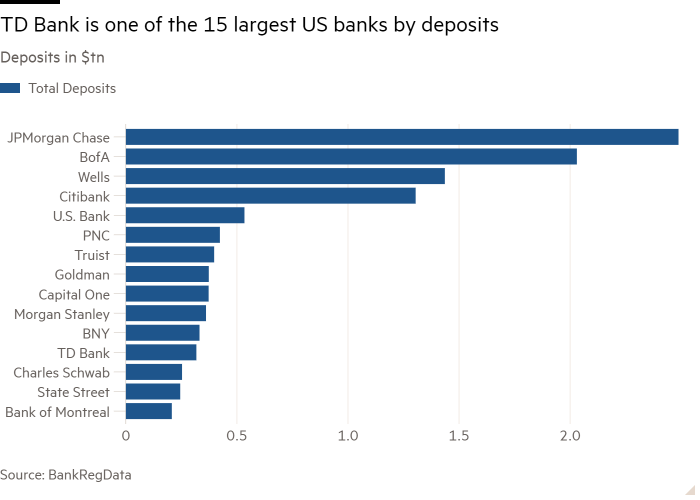
Employees at TD Bank were growing increasingly alarmed three years ago about lax internal controls that had made it a hotbed for money-laundering, drug trafficking and terrorist financing.
When one anti-money laundering employee asked a fellow risk manager “what do the bad guys have to say about us”, his colleague replied “lol” before adding that TD was an “easy target”. Another joked that its failure to fix anti-money laundering issues was simply the bank living up to its slogan as “America’s Most Convenient Bank”.
Yet at the same time, executives at the bright-green branded Canadian lender were telling investors it was primed for growth in the US.
The failures ended up costing TD just over $3bn in penalties in a settlement with US authorities on Thursday, as well as limits on its US expansion in the coming years. The bank has had to scrap plans for a $13.4bn acquisition of US lender First Horizon, and TD’s chief executive has announced plans to step down.
TD on Thursday pleaded guilty to conspiring to fail to maintain an anti-money laundering programme, failing to file accurate currency transaction reports and conspiracy to launder money. The fines are the largest ever under the US’s Bank Secrecy Act, which requires banks to be vigilant of suspicious money flows. It was also hit with the largest civil penalty against a bank in the US Treasury’s history.

The US government alleged that between 2014 and 2023, TD had “long-term, pervasive, and systemic deficiencies” in its AML procedures as it instead enforced policies to keep costs flat.
Suzanne Lynch, former director of financial crime programmes at Utica University, described the breadth of the crimes and scale of the fines as “stunning”.
“I suspect it will reverberate for years to come,” said Lynch, who previously worked in financial crime prevention and investigations at Comerica, Mastercard and Goldman Sachs.
Prosecutors said these shortcomings allowed three money-laundering networks to transfer more than $670mn through TD accounts between 2019 and 2023.
Lisa Monaco, deputy US attorney-general, highlighted that federal regulators started penalising TD for lacking money-laundering controls in 2013. “But as the light continued blinking red, TD Bank could only see green,” she said.
US attorney-general Merrick Garland described TD’s automated transaction monitoring system as “wilfully deficient”, adding that “high-level executives, including the person who became the bank’s chief anti-money laundering officer, knew there were serious problems . . . but the bank failed to correct them”.
The Toronto-based lender, one of the 15 biggest banks in the US with about $300bn in deposits, had set aside more than $2.5bn to cover potential penalties from the US investigation. But the scale of the penalty still caught investors off guard, with the bank’s stock closing down 5 per cent on Thursday.
In a call with analysts on Thursday, TD expressed contrition.
“We’ve taken full responsibility for these significant failures, and I’ve taken responsibility as this happened on my watch as CEO,” TD chief executive Bharat Masrani said on the call.
TD had last month said Masrani would step down as CEO in April next year and be replaced by the head of its Canadian personal banking division, Raymond Chun.
Court documents filed by the US government paint a damning picture for the bank involving bribes to employees and penny pinching on spending for new compliance infrastructure.
The biggest money-laundering scheme involved Da Ying Sze, who moved more than $470mn through TD bank branches in New Jersey, New York, Pennsylvania, Maine and Florida between 2018 and 2021.
The money stemmed from drug sale proceeds, including fentanyl, which has become the main cause of overdoses in the US and remains a hot-button issue leading up to the presidential elections next month. The DoJ has cracked down on cartels as well as chemical companies involved in fentanyl’s illicit supply chain, which stretches from China to Latin America.
TD employees, who received more than $57,000 in gift cards from Sze, suspected illegal behaviour, prosecutors said.
According to court filings, after Sze and co-conspirators purchased more than $1mn in official bank cheques with cash in a single day, a TD branch employee asked: “How is that not money laundering?” A colleague replied: “oh it 100% is”.
Sze in 2022 pleaded guilty to the money laundering and unlicensed money transmitting schemes that flowed through TD.
In a separate money-laundering operation, a business seemingly involved in the wholesale diamond, gold and jewellery business used TD accounts for at least five shell companies to move roughly $123mn through the bank.
TD took no action after retail staff flagged these as unusual transactions, arguing the deposits were “excessive for their type of industry” — until law enforcement alerted the lender.
A third illicit scheme used roughly 30 TD accounts to withdraw funds stemming from drug proceeds at cash machines in Colombia using debit cards, resulting in the illicit transfer of more than $39mn. The same Venezuelan passports were used multiple times to open TD accounts. In some cases, more than 50 debit cards were issued for a single account.
The criminal organisation paid bank staff bribes ranging from $50 to $2,500 per bank account, which were paid into workers’ personal TD accounts or via some of the illicit debit cards.
TD’s AML team analysed the Colombia scheme and made recommendations including probing “inside jobs” and training branch staff, but the bank did not implement any of them in the 18 months thereafter, prosecutors said.
Under the plea agreement, TD must mend its compliance programme, install independent monitors for three to four years and report misconduct to the government. Garland warned “we would expect future cases against individuals” as the investigation remains ongoing.
The DoJ pointed to TD’s lack of investment in compliance controls in an attempt to keep a lid on spending, a move that Monaco criticised as short sighted.
“When it comes to compliance, there are really only two options: invest now or face severe consequences later,” she said. “As I’ve said before, a corporate strategy that pursues profits at the expense of compliance isn’t a path to riches, it’s a path to federal prosecution.”
Additional reporting by Stephen Gandel